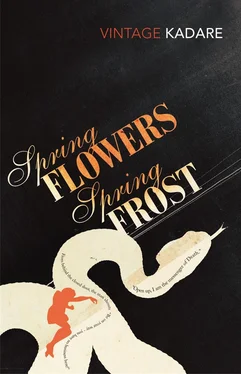“Mark,” she said, with her eyes steady on him. “We have come about something very important.”
“I was sure you had,” he replied.
She took a deep breath. He quickly realized that only she would speak. The brother and the sister must have gone over the issue many times together, he thought, for hours on end, side by side….
What she said turned out to be a bit of a muddle. Conventional ways of saying things seemed not much use in the context. Rather the opposite: instead of opening up new lines of thought, they seemed to block things off. Her brother had killed, in circumstances that were obscure. Contrary to what many people thought, he had not been pressured into committing the act by some devotee of the ancient Kanun — such as their uncle. It was sheer chance that made their uncle’s four-day stay coincide with the period of deep distress that Angelin had gone through. If they had had a different visitor at that time — say, the leader of a Japanese or Tibetan sect, a collector of weapons for Kosovo, an Irish Republican, or a member of a secret society recruiting suicide bombers to rid the world of dictators — then Angelina fate might also have been quite different. But what came up was the Kanun , and he had been entranced by it. It really was bad luck that news of the Kosovo uprising had been so long in coming, just like the reply from the Association of Young Idealists in Tirana.
During his stay in Tirana the previous spring, he had suffered his first great shock. He’d been out every evening with his cousins and their friends, crawling from bar to dive and from bingo hall to gambling den. His rejection had come in stages. At first, he thought that the money talk would eventually run out and give way to other subjects of discussion. But night after night the talk of money resumed, ever more anxious, more desperate, smothering everything else and becoming, in the end, suffocating. After so many years of tightened belts, his sister said, to justify this state of affairs, it was perfectly normal that people should be greedy for material satisfactions. But Angelin could not get used to it. Such greed seemed to him an ill omen. On his fourth evening in the capital, he invented an excuse for not going to bingo. The next day he did not even want to go outside. I know what you re feeling, his sister told him then. And she’d told him about the Association of Young Idealists, as she’d come across two of its members quite by chance. The same afternoon, the four of them got together at the Piazza Café. He listened patiently to the Idealists as they laid out their program, and then opined that a more radical plan of action was needed. He admitted he had always been slow in reacting to events. His favorite hero was Jan Palac, the Czech who had set fire to himself to protest the Russian occupation, but he had never had the opportunity to do anything similar: he was only fourteen when the Communist regime had fallen. After that, things had changed in such a confusing way that he had found it difficult to know how to orient himself. He was ready to join their organization and to carry out any of its orders. If they decided to issue warnings to corrupt ministers of state, and then to members of parliament, for instance, and if these high and mighty folk did not give up their ignoble ways, then he was prepared to put the threats into effect, with his own hand … that is to say, to carry out the first murder!
The two Idealists were dumbfounded. They declared they had never gone so far as to envisage action of that kind. In any event, they would give him an answer on that point later.
Angelin returned to the North and waited in vain for the Idealists 5answer. His eyes became ever hollower. He spoke less and less. And that was when the uncle from the country came on his visit. He too was full of rancor and deeply disappointed. In his view, the country was going to the dogs. Decline and decay were everywhere to be seen. Courage and honor, which he had expected to be reinvigorated by the fall of Communism, were losing ever more ground. The only hope lay in the resurrection of the old customary law. The doreras , the executioners, had been the flower of the country’s youth. Unlike their counterparts today, who played bingo until dawn, the doreras had gone bravely toward their own death…. Angelin listened to this talk with utter disdain.
He had never had any particular respect for the Kanun , and he would no doubt have continued listening to his uncle in the same way, that is to say, with indifference, if in the flood of the old man’s words there hadn’t been three or four that struck him and entered his head like well-aimed nails. Those young executioners, the country’s hope, had no thought for gain, the uncle had said. They were ready to run in the precisely opposite direction: to their loss.
These words left Angelin stunned. The uncle had gone on talking, longer than he ever talked before, until his nephew interrupted him to ask if there were not blood to be claimed by their family.
From one moment to the next, the uncle’s speech slowed down, became as heavy and bare as the flagstones in a mausoleum. Yes, within their very own family, there was a blood that had not been taken back. That was the very reason that he had taken to the roads in midwinter. The Communists may have stolen their pastures and a part of their herd, but they couldn’t take away the command of the blood. Yes, sure, they had tried to do that too. At school and in meetings they had said time and again that young people should be ready to lay down their lives for the ideas of Lenin, but everyone knew now that that business was finished…. Yes, so there was a blood to be reclaimed by their family, and neither he, nor his children, nor his children’s children, would ever be able to escape it.
Angelin interrupted his uncle once again to ask for the name of the blood debtor. Then they both fell silent.
The day after the murder, remorse came faster than he had thought it would. The first night, he had waited in vain for sleep to come. On the second night too. What came to him instead was a vision of the blue necktie of his victim at the moment when he fell. It had waved to the side, as if wanting to stay up in the air a little longer, while its owner fell to the ground. Angelin had long dreamed of having such a fine tie, and he imagined he could see it coming toward his own neck. Since its owner was now not of this world, nothing stopped the tie from being his….
He had told his sister all that in the course of the many hours they had spent together after the execution. He had waited a long time for an order to obey. No such thing came to him from any quarter, so he yielded to what cropped up on his path — the Kanun. As soon as he had carried out the act, he realized that the order was wrong. But it was too late….
As she recounted the hours she and her brother had spent together since the fatal act, Mark could easily imagine the two of them in conversation. Oddly enough, he could only imagine it as a conversation between two naked bodies, both of them stripped and scrubbed, as if in preparation for leaving the world, beside a grave, or awaiting a postmortem. My God, he thought, that is exactly when they must have committed incest!
She finally got around to explaining the reason for their visit. Her explanations became more and more confused. Her brother was now entangled in the blood feud, because of the murder, and was therefore unable to do anything useful for anybody. For example, he couldn’t go to Kosovo, where the insurrection had now broken out. He would either have to hide, or risk the revenge of the other clan, or give himself up to the authorities. In any case, nothing could now stop the blood from following its course. Whether he took refuge in the highlands or behind prison bars or in the grave, he had no means of stopping the wheels of the machine. If he went into hiding or into prison, then the opposing clan would kill someone else in his stead. If he were to die, then his own clan would be drawn into the infernal cycle. So everything would unfold along lines laid down centuries ago. And that was also the main cause of his distress: he had wanted to put a situation to right, to do something for others, and he found he had done precisely the opposite. As for knowing how to atone for his act, he … or rather, she and he (it had to be the two of them, Mark thought, with her white body laid out beside his thin and waxen shape, on the dissecting table) … well, they had had long arguments over it, because Angelin, against his sister’s strong advice, had resolved to give up his life. However, the Kanun did not permit suicide, so he had thought of asking for help from the state … and that was why they had come to see Mark.
Читать дальше












